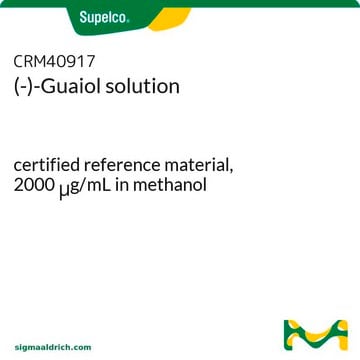48798
Geraniol
analytical standard
Synonym(s):
trans-3,7-Dimethyl-2,6-octadien-1-ol
About This Item
Recommended Products
grade
analytical standard
Quality Level
vapor density
5.31 (vs air)
Assay
≥98.5% (GC)
shelf life
limited shelf life, expiry date on the label
technique(s)
HPLC: suitable
gas chromatography (GC): suitable
refractive index
n20/D 1.474 (lit.)
n20/D 1.478
bp
229-230 °C (lit.)
density
0.879 g/mL at 20 °C (lit.)
application(s)
cleaning products
cosmetics
environmental
flavors and fragrances
food and beverages
personal care
format
neat
storage temp.
2-8°C
SMILES string
C\C(C)=C\CC\C(C)=C\CO
InChI
1S/C10H18O/c1-9(2)5-4-6-10(3)7-8-11/h5,7,11H,4,6,8H2,1-3H3/b10-7+
InChI key
GLZPCOQZEFWAFX-JXMROGBWSA-N
Looking for similar products? Visit Product Comparison Guide
Application
Other Notes
Signal Word
Danger
Hazard Statements
Precautionary Statements
Hazard Classifications
Eye Dam. 1 - Skin Irrit. 2 - Skin Sens. 1
Storage Class Code
10 - Combustible liquids
WGK
WGK 1
Flash Point(F)
226.4 °F - closed cup
Flash Point(C)
108 °C - closed cup
Personal Protective Equipment
Choose from one of the most recent versions:
Already Own This Product?
Find documentation for the products that you have recently purchased in the Document Library.
Customers Also Viewed
Our team of scientists has experience in all areas of research including Life Science, Material Science, Chemical Synthesis, Chromatography, Analytical and many others.
Contact Technical Service












